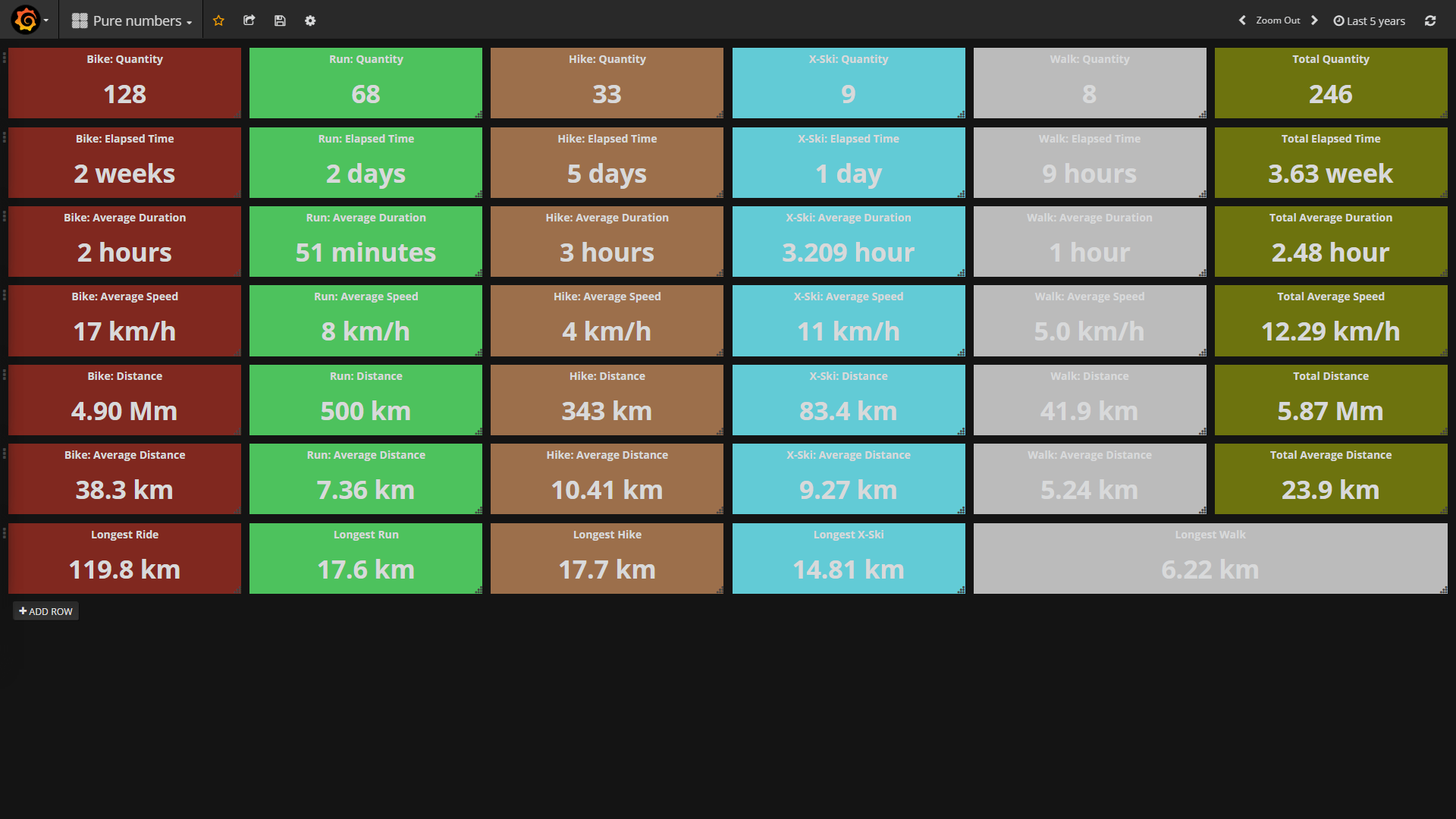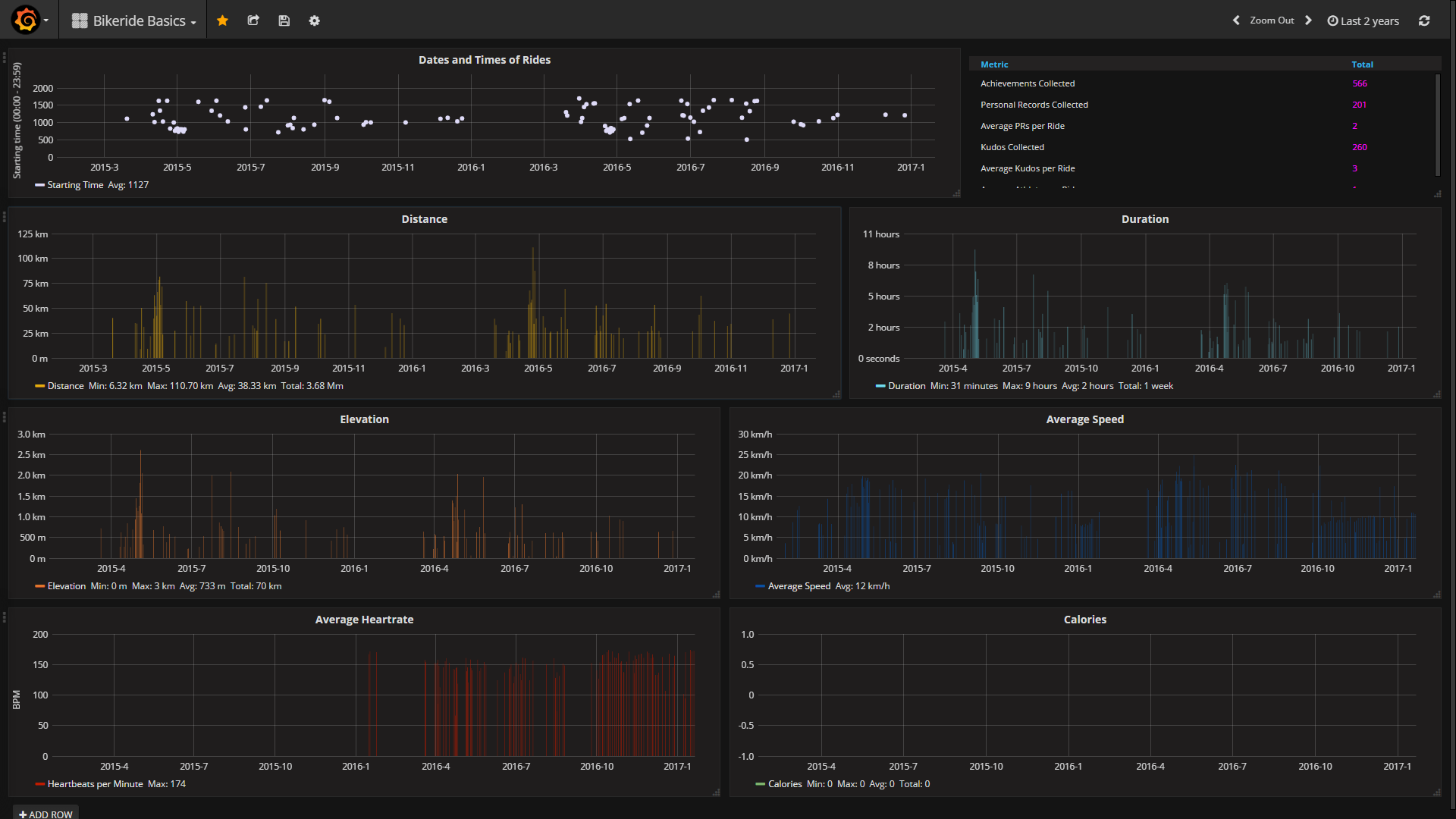Grava uses the Strava API to collect your personal activities. The activities are written inside a database and can be analysed afterwards. The used database InfluxDB is a time series database.
Grafana is used for visualizing and analysing the metrics of the activities. The helper code is written in Python.
Grava is not designed to run on public servers or should be accessable from the internet. It should run in your protected network. It handles data. Be careful. Keep your secrets to yourself and don't share data or at least careful.
## Status **Version 0.2**
Grava is in a developing/testing state. There are several issues and missing features. You are welcome to test it. For testing place a limit to the query and use a test database.
- token_helper.py: helps to get your Strava authentication tokens
- grava_init_backend.py: Reads your Strava activities, normalise the data and writes it into a InfluxDB database
- grava_init_frontend.py: Creates Grafana datasources and reads JSON templates to create Grafana dashboards
1. Clone this repository (Linux)
git clone https://github.com/rotti/grava.git
cd grava
2. InfluxDB: Linux Installation (Ubuntu)
sudo apt-get update
curl -sL https://repos.influxdata.com/influxdb.key | sudo apt-key add - source /etc/lsb-release echo "deb https://repos.influxdata.com/${DISTRIB_ID,,} ${DISTRIB_CODENAME} stable" | sudo tee /etc/apt/sources.list.d/influxdb.lis
sudo apt-get update && sudo apt-get install influxdb
Find further help here: https://docs.influxdata.com/influxdb/v1.1/introduction/installation/
3. Grafana: Linux Installation (Ubuntu)
echo "deb https://packagecloud.io/grafana/stable/debian/ wheezy main" | sudo tee /etc/apt/sources.list.d/grafana.list
curl https://packagecloud.io/gpg.key | sudo apt-key add -
sudo apt-get update && sudo apt-get install grafana
Find further help here: http://docs.grafana.org/installation/debian/
If you want to use another visualising tool than Grafana, skip this step.
4. Python Library: Linux Installation
TODO
pip install influxdb, xxxxxxxxxx
5. Start the Backend Services (Ubuntu)
sudo service influxdb start
sudo service grafana-server start
6. Fill Database with Strava Activities
python grava_init_backend.py
You will need your Strava Access Token to get your Strava activities. Use *token_helper.py" the get it.
7. Generate Grafana Datasources and Dashboards (optional)
python grava_init_frontend.py
grava_init_frontend.py will create a datasource and uploads all dashboards from the directory ./dashboards.
You can export your custom dashboards to JSON and make the upload later on with grava_init_frontend.py. The filename of your dashboard must be in the format filename.json. Find further help to make dashboards here: http://docs.grafana.org/
8. Login to Grafana
Open a browser and connect to Grafana. If it runs on your system the URL would be http://localhost:3000
Login with the credentials ...
User: admin Passwort: admin
9. Have fun with Grava
Now you are able to explore the dashboards. Please note that, they are made for my purposes and sport types (bike rides, runs, hikes, walks, X-ski). Adapt my dashboards or create your own.
Token helper gets your Strava access token and writes it to a file inside your authfile directory ("./authfiles/access_token"). It also provides help to get your code needed for the token exchange.
1. Register as a developer at strava.com and create your project to get your ClientID and your Client Secret.
2. Write your ClientID inside the file
./authfiles/client_id
3. Write your Client Secret inside the file
./authfiles/strava_secret
4. Write your exchange token inside the file
./authfiles/auth_code
5. Execute token_helper.py with
python token_helper.py
To get your exchange token open a browser and use the following URL. Don't forget to put your ClientID inside the URL:
Login with your Strava credentials and authorise your application. Afterwards you will receive and "Unable to connect" failure from your browser. Ignore it. You will receive your exchange token. It will loke something like
http://localhost/token_exchange?state=mystate&code=**1d1de858d2005b56e02d16d657cfad8bbc769a6f**
Paste the "code" to your file. It is your exchange token needed for step 4.
token_helper.py can provide some help to get your exchange token. Uncomment the specified section inside the code and execute it afterwards. Don't forget to put the comments in again afterwards. It will open a browser for you and will put in the needed URL.
Find further help here: https://strava.github.io/api/v3/oauth/
There are always missing features. Here is a small list of things Grava is missing.
- Write better code. The never ending story, after all :)
- Deliver useful (more) dashboards for analysing.
- Write a script and try to install Grava without having the user to do stuff.
https://groups.google.com/forum/m/#!forum/strava-api
http://www.andremiller.net/content/grafana-and-influxdb-quickstart-on-ubuntu
https://github.com/weaveworks/grafanalib
https://github.com/hozn/stravalib
https://github.com/influxdata/influxdb-python
http://influxdb-python.readthedocs.io/en/latest/examples.html
https://docs.influxdata.com/influxdb/v0.8/api/query_language/

